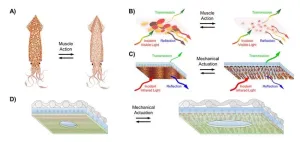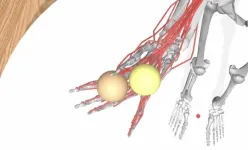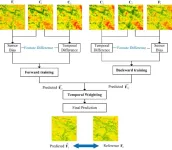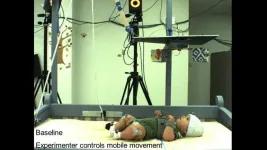(Press-News.org) Researchers at McMaster University have identified a new therapeutic approach to preventing cancer from spreading to the brain.
In a new study, published recently in the journal Cell Reports Medicine, researchers Sheila Singh and Jakob Magolan discovered a critical vulnerability in metastatic brain cancer, which they say can be exploited with new drugs to prevent spread.
Singh, a professor in McMaster’s Department of Surgery and director of the Centre for Discovery in Cancer Research, says brain metastases are becoming increasingly prevalent and are extremely fatal, with 90 per cent of patients dying within one year of diagnosis. She notes that lung cancer, breast cancer, and melanoma most often result in brain metastases.
“We’re getting much better at curing these primary cancers, but even when we do, a tiny percentage of cancer cells can escape and circulate to other parts of the body, including the brain,” she explains. “When this happens, it’s often an end-stage cancer — treatment-resistant and highly evasive.”
Magolan, a professor of medicinal chemistry in McMaster’s Department of Biochemistry and Biomedical Sciences, suggests thinking of an organ as an island in an ocean, and cancer as a city developing atop it. Some cities, he says, may develop marinas full of ships to explore and settle on other islands — these ships are the rare cancer cells that can metastasize to other organs.
“We have figured out how to sink these ships while they’re in transit — and likely before they even set sail,” he says.
The interdisciplinary research team is targeting an enzyme called IMPDH, which is essential to the cancer cells that can initiate brain metastases. By designing drugs that inhibit this enzyme, they anticipate that they can stop brain metastasis from occurring.
To date, the researchers have synthesized and evaluated more than 500 candidate molecules — a huge endeavour, especially for academic laboratories.
“Typically, a discovery program in a big pharmaceutical company will make about 1,000 molecules before selecting one to advance to the final stages of pre-clinical efficacy and safety studies,” explains Magolan, who is part of the executive committee at McMaster’s Global Nexus. “We’re more than halfway through such an industrial-sized program now, with promising compounds in hand, and most of the research is being done here at McMaster.”
Of the 500-plus molecules studied to date, the research team has identified dozens with potent activity against the target enzyme. Today, they are optimizing these lead molecules even further before selecting top candidates for evaluation in animal models, which will establish the foundations for eventual human clinical trials.
This large-scale study has been supported by $2 million in funding and research assistance from adMare BioInnovations, and has been driven largely by staff, students, and trainees at both the Boris Family Medicinal Chemistry Laboratory and the Singh Lab.
One such trainee is Agata Kieliszek, a postdoctoral fellow in the Singh Lab and the lead author on the new paper. Kieliszek says she is moved by the fact that this study may eventually lead to an all-new standard of care.
“Brain metastases are the most common brain tumours in adults, and the standard of care is largely palliative,” she explains. “With this work, we’ve uncovered a target for slowing brain metastasis outgrowth, which, with further research, could offer an alternative treatment option for patients who are otherwise limited to palliation.”
Beyond the paradigm-changing potential of their findings, the researchers are also optimistic about the broader implications of this study.
“The compounds that we’re looking at prevent spread to the brain, but the principles of metastasis are potentially similar across other organs,” Magolan says. “I am hopeful that this program might open a gateway to anti-metastasis therapies that can prevent other types of cancer spread.”
The research team intends to spin-out a new start-up company that will focus on translating this research into a first-in-class precision medicine against brain metastasis.
----
Available for interviews:
Senior author Sheila Singh can be contacted directly by email at ssingh@mcmaster.ca.
Senior author Jakob Magolan can be contacted directly at magolanj@mcmaster.ca.
Lead author Agata Kieliszek can be contacted directly at kielisa@mcmaster.ca.
For any additional information or to obtain an embargoed copy of the study, contact Adam Ward, media relations officer with McMaster University’s Faculty of Health Sciences, at warda17@mcmaster.ca. Please note, I am out of the office on Sept. 26 and 27. If you need assistance during that time, please contact Jennifer Stranges, at stranj4@mcmaster.ca.
END
McMaster University researchers identify new therapeutic approach to preventing cancer from spreading to the brain
2024-10-01
ELSE PRESS RELEASES FROM THIS DATE:
Squid-inspired fabric for temperature-controlled clothing
2024-10-01
WASHINGTON, October 1, 2024 – Too warm with a jacket on but too cold without it? Athletic apparel brands boast temperature-controlling fabrics that adapt to every climate with lightweight but warm products. Yet, consider a fabric that you can adjust to fit your specific temperature needs.
Inspired by the dynamic color-changing properties of squid skin, researchers from the University of California, Irvine developed a method to manufacture a heat-adjusting material that is breathable and washable and can be integrated into flexible fabric. They published their ...
Using antimatter to detect nuclear radiation
2024-10-01
WASHINGTON, Oct. 1, 2024 – Nuclear fission reactors act as a key power source for many parts of the world and worldwide power capacity is expected to nearly double by 2050. One issue, however, is the difficulty of discerning whether a nuclear reactor is being used to also create material for nuclear weapons. Capturing and analyzing antimatter particles has shown promise for monitoring what specific reactor operations are occurring, even from hundreds of miles away.
In AIP Advances, by AIP Publishing, researchers from the University of Sheffield and the University of Hawaii developed ...
Modeling the minutia of motor manipulation with AI
2024-10-01
In neuroscience and biomedical engineering, accurately modeling the complex movements of the human hand has long been a significant challenge. Current models often struggle to capture the intricate interplay between the brain's motor commands and the physical actions of muscles and tendons. This gap not only hinders scientific progress but also limits the development of effective neuroprosthetics aimed at restoring hand function for those with limb loss or paralysis.
EPFL professor Alexander Mathis and his team have developed an AI-driven approach that ...
Survival gap eliminated for Black cord blood recipients with blood cancers, study finds
2024-10-01
Patients who receive umbilical cord blood transplants for blood cancers now live equally long regardless of their race, new research from UVA Cancer Center shows.
The findings, from UVA Health’s Karen Ballen, MD, and collaborators, suggests that a previously identified survival gap for Black recipients has closed and that overall survival for all recipients has increased.
The retrospective analysis looked at more than 2,600 adults and children with blood cancers who received cord blood between 2007 and 2017 ...
Nominate a stroke hero today: 2025 Stroke Hero Awards open for submissions
2024-10-01
DALLAS, Oct. 1, 2024 – Strokes can strike at any age, challenging survivors to overcome physical, emotional and cognitive changes. Nominations are open now for the 2025 Stroke Hero Awards from the American Stroke Association, a division of the American Heart Association, which is celebrating a century of lifesaving impact this year. The awards recognize stroke survivors, caregivers, advocates and experts making a difference in the stroke community.
Every 40 seconds someone in the U.S. has a stroke[1], according to the American Heart Association’s 2024 Heart Disease and Stroke Statistical Update. Nearly 1 in 4 stroke survivors face the ...
Seven years on, INSEAD study reveals #MeToo's unexpected impact
2024-10-01
Seven years after actor Alyssa Milano’s tweet launched the #MeToo movement into the global consciousness, attitudes towards sexual harassment and assault have shifted in many countries. A new study shows that the movement’s impact doesn’t stop there.
INSEAD professors Frédéric Godart and David Dubois, alongside Clément Bellet of Erasmus University Rotterdam, found that #MeToo triggered far-reaching changes in consumer behaviour. Sales of stereotypically feminine shoes like high heels dropped significantly weeks after the #MeToo movement swept the media ...
Addressing the geriatric healthcare workforce shortage
2024-10-01
INDIANAPOLIS – The pandemic has highlighted the acute shortage of nurses and nursing assistants needed to care for the growing number of older adults in long-term care facilities. Yet getting nursing students excited, engaged and feeling competent to take on the challenges of caring for nursing home patients has proved elusive.
To address this critical workforce gap, researchers from Regenstrief Institute and the Indiana University School of Medicine have developed and tested an innovative curriculum for nursing students, exposing ...
Age trumps gender, income and postcode for consumers' clothing habits
2024-10-01
The first-ever nationwide study into how Australians use and dispose of clothing has revealed people are buying too many clothes and are unsure how to discard them responsibly.
Conducted by RMIT University and commissioned by the Kmart Group and the Queensland Government, a study of 3,080 Australians explored how they acquired, used and disposed of their clothing.
Australians are among the world’s biggest clothing consumers, importing 1.4 billion units or over 383,000 tonnes annually.
But each year, more than 200,000 tonnes of clothing is sent to landfill.
The authors recommend establishing a national textile collection program for unwearable clothing that ...
Researchers develop method to obtain fine spatial and temporal resolution land surface temperature data
2024-10-01
Scientists need fine spatial and temporal resolution land surface temperature (LST) data for many types of research and applications. Spatio-temporal fusion, a technique that combines data from multiple sources to create high-resolution images with both spatial (space) and temporal (time) details, is an important solution for researchers needing fine spatio-temporal resolution LST data. A team of researchers propose a new spatio-temporal fusion method based on Restormer (RES-STF).
Their work is published in the Journal of Remote Sensing on August 21, 2024.
LST data, the measurement ...
Feet first: AI reveals how infants connect with their world
2024-10-01
Recent advances in computing and artificial intelligence, along with insights into infant learning, suggest that machine and deep learning techniques can help us study how infants transition from random exploratory movements to purposeful actions. Most research has focused on babies’ spontaneous movements, distinguishing between fidgety and non-fidgety behaviors.
While early movements may seem chaotic, they reveal meaningful patterns as infants interact with their environment. However, we still lack understanding of how infants intentionally engage with their surroundings and the principles guiding their ...







